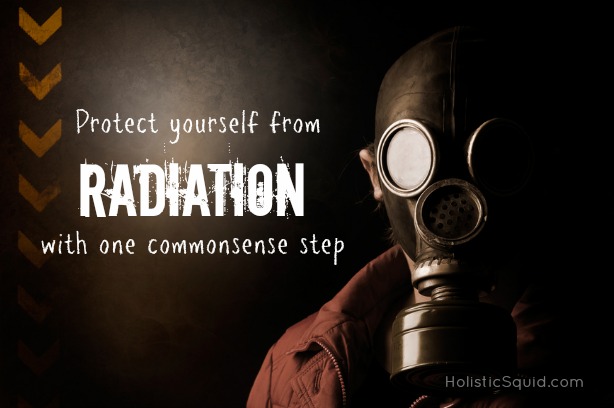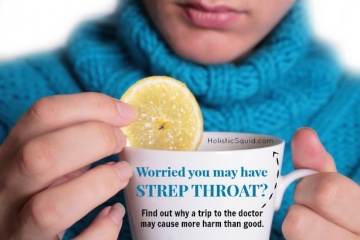

Worried about radiation exposure? Accidents at nuclear powder plants – like the one in Fukushima – might have you avoiding seafood from the West coast. But before you put on your radiation suit, it’s important to understand what radiation is and how it affects you.
Nuclear Radiation 101
Before you put on your radiation suit, it's important to understand what radiation is and how it affects you. The most common radioactive elements that end up in the environment from a leak or explosion are iodine and caesium. Your body will naturally absorb the radioactive isotopes of these elements, which can result in serious illness depending on concentration levels and length of exposure.
Small amounts of caesium-134, caesium-137, and iodine-131 were released into the environment during nearly all nuclear weapon tests and some nuclear accidents, and are not otherwise produced in nature.
Whereas iodine-131 has a half-life of 8 days, caesium-134 has a half-life of 2 years and caesium-137 is a whopping 30 years – meaning it takes that long for half of the radioactive atoms in each substance to disintegrate. The amount of time it takes all of it to degrade is far longer than that.
As such, caesium-137 is the radioactive isotope that is the biggest health concern in the current aftermath of Fukushima and other nuclear disasters because its threat is likely to last far beyond our lifetime.
For those immediately exposed to high levels of radiation, the World Health Organization recommends taking potassium iodide to prevent the thyroid’s uptake of radioactive iodine. The best antidote for caesium is a substance called Prussian Blue. Although the CDC discusses it here, there is surprisingly very little information about Prussian Blue in regards to treating those exposed to Fukushima radiation. (source)
Unfortunately, these treatments are not meant for preventative use and can have severe side effects when misused or taken by the wrong individuals.
As Chemist Boyd Haley wisely points out: “It is the inability to see the effects of chronic, low level toxicities on human health that has been, and remains, our greatest failing as intelligent beings.” For most folks on the planet who have not been immediately exposed to high levels of radioactive materials, the issue is protecting ourselves from ongoing, long-term exposure to low levels of radiation.
So what's a radiation-soaked planet to do?
The single most important thing to protect yourself from radiation
Here's a fact: The healthier you are prior to exposure – whether it's to bacteria, a virus, chemicals , or a radioactive substance – the better the chances your body has of successfully detoxifying and the less chance you have of experiencing long-term damage or illness.
On this blog I talk a lot about the importance of healthy diet and lifestyle. Short of moving to another planet, your greatest defense against the long-term risks associated with nuclear radiation is to eat a properly-sourced, nutrient-dense diet.
If you've been turning a blind eye to healthy eating or just eating a bunch of organic veggies and hoping for the best, please be sure to read this post about adopting a real food lifestyle to learn more about the benefits of pasture-raised meats and dairy, saturated fat, real salt, fermented foods, and other traditional food secrets that may shock even the most diligent of healthy eaters.
Protect yourself from radiation exposure – 3 things you don't want to miss:
1 – Vitamin D
Radiological health expert Daniel Hayes, Ph.D. advises that Vitamin D can be used as a preventative measure to protect yourself from radiation exposure in the long-term (source). This nutrient is essential for many functions in the body, especially immune system health. The most effective way to get Vitamin D is from direct exposure to the sun, though there are some dietary sources and supplement options as well. You can read more about how to get enough Vitamin D in this post.
2 – Antioxidants
Free radicals are unstable, highly reactive molecules that can form as a result of normal body functions as well as from excessive exposure to environmental factors such as pollution, radiation, herbicides and other toxins. Antioxidants greatly reduce cell damage by stabilizing these free radicals, and when cells are not being damaged by free radicals the body has greater fortitude to defend itself.
By eating a diet rich in seasonal fruits, veggies, spices, and oils you will consume plenty of the best and freshest sources of antioxidants to help protect yourself from the long-term risks of radiation.
If you live in a high-pollution area or near a nuclear power plant, you certainly should consider taking additional antioxidant supplements as a daily measure of prevention. Look for vitamin C, carotenoids, and polyphenoids which each have their own special way of functioning. (source)
3 – Fermented foods
Cultured (or fermented) foods contain naturally occurring probiotics (good germs) that provide a wide variety of health benefits. By populating the digestive tract with healthy bacteria, the immune system can function optimally. A good balance of beneficial flora in the gut helps crowd out pathogenic parasites, yeast and bacteria and assists in the production of B vitamins.
Aim to eat a small amount of cultured food, drink or condiment at each meal to infuse your diet with the protective benefits of cultured foods such as yogurt, kefir, kombucha, miso, and raw sauerkraut.
By boosting the beneficial flora in your digestive tract, fermented foods help protect against parasites, bacteria and even radiation. Find out more about making your own yogurt, kombucha and sauerkraut here.
Want extra protection from the harmful effects of radiation exposure?
In addition to nutrient-dense, immune supporting foods, there are several supplements that can be especially helpful in decreasing inflammation, improving immune function, and helping the body to detoxify.
Turmeric
Turmeric (whose active ingredient you may know as curcumin) has been shown to possess anti-carcinogenic properties through its anti-inflammatory effect, and has been the focus of hundreds of studies that verify its powerful ability to protect cells from damage. Aside from using it in cooking, the recommended dose is 2-4 grams daily. (source)
This organic turmeric supplement is paired with a bit of ginger (great for digestion) and not a bunch of other junk.
Reishi and cordyceps
These magical medicinal mushrooms have long been used in Asian medicine to increase immune function, protect cells from free radical damage, and help the liver eliminate toxins. (source)
As a Chinese herbalist myself, I absolutely trust the quality of this reishi and this cordyceps (both capsules and liquid).
Glutathione
Glutathione has been called ‘The Mother of all Antioxidants' and for good reason. Aside from detoxification, glutathione is also crucial for energy production and proper functioning of the immune system, assisting other anti-oxidants in their jobs.
Normally your body produces its own glutathione that it can recycle and reuse. Unfortunately, when the toxic load becomes too great (from poor diet, stress, trauma, pollution, aging, infections, radiation, etc.) your glutathione becomes depleted, leaving you vulnerable to cell damage from free radicals, infection, and abnormal cell growth. Without the protective function of glutathione, your liver can become overloaded, so it's unable to do its job of detoxification.
Consume fresh whey and lacto-fermented foods made with whey which contains cysteine, an amino acid essential for glutathione synthesis. Exercise also boosts your glutathione levels and thereby helps boost your immune system, improve detoxification and enhance your body's own antioxidant defenses.
Choosing a glutathione supplement is tricky because – taken straight – glutathione is broken down in the digestive tract and as a result, is essentially useless. Some people have supplemented pre-cursors to glutathione like N-acetyl-cysteine (NAC), the most crucial amino acid needed to make glutathione. However, many folks with glutathione deficiency are unable to synthesize glutathione very well.
There are currently a few forms of gluathione that your body can assimilate more easily, without worry of destruction:
- Lypo-speric glutathione (like this one)
- Acetyl Glutathione (like this one)
- IV glutathoine, administered by a qualified health practitioner only
Iodine
While potassium iodide can be used to protect your thyroid during acute, severe exposure to radiation, having adequate levels of iodine from safe, natural sources is a more practical approach for long term protection against radiation.
Some feel that westerners are already deficient in iodine which predisposes us to developing breast cancer, thyroid conditions, and other chronic disorders. I recently read The Iodine Crisis and experimented a bit with the protocol that Lynne Farrow outlines in her book. To be honest, I'm not completely convinced that the masses should supplement with iodine, but I do think that most of us could use more iodine-rich foods in our daily diets, including seaweed, seafood, raw milk, and pastured eggs.
Spirulina
I'm not usually a big fan of new-fangled superfoods, but spirulina deserves a nod when it comes to protecting yourself from radiation.
After the nuclear disaster in Chernobyl, a group of children was given a daily dose of spirulina, and then followed by the Institute of Radiation Medicine in Minsk. After 45 days, this group was reported as having improved immune function, and most notably “spirulina was particularly efficient at deactivating radioactive caesium from their bodies.” (source) Pretty impressive.
Fresh water algae supplements such as spirulina and chlorella are said to have similar protective benefits against radiation to their cousins from the sea. Be sure to choose these supplements from a trusted source.
Do we need to avoid radiation exposure in fish, seaweed, and milk?
According to this report from UC Berkeley, nearly all of the samples of plants, water, air, soil and milk have come back with nearly undetectable levels. (source) There are some fish on the West coast being tested for radiation that have traces of caesium, indicating that they had been exposed at Fukushima. However, the amounts are so small that you would have to eat literally tons of contaminated fish in one year to be in the danger zone. You can read more about radiation in fish in this post.
Milk is very susceptible to radiation, especially radioactive iodine, but the half-life is only 8 days. If you suspect that your local milk could be contaminated, avoid it for a couple of weeks and you should be fine.
Rather than fearing these wonderful nutritious foods, I'd focus on eliminating processed, packaged junk instead, which can derail your efforts in protecting your health.
Will a healthy diet be enough to protect yourself from radiation? I suppose only time will tell, but for now this is our smartest (and most delicious) solution to a healthy future.












Hi I have been exposed with radiation poisoning by the use of a hot air gun over a year ago…is there more information available or advise on natural remedies? Unfortunately my doctor was very unhelpful and did not believe me…